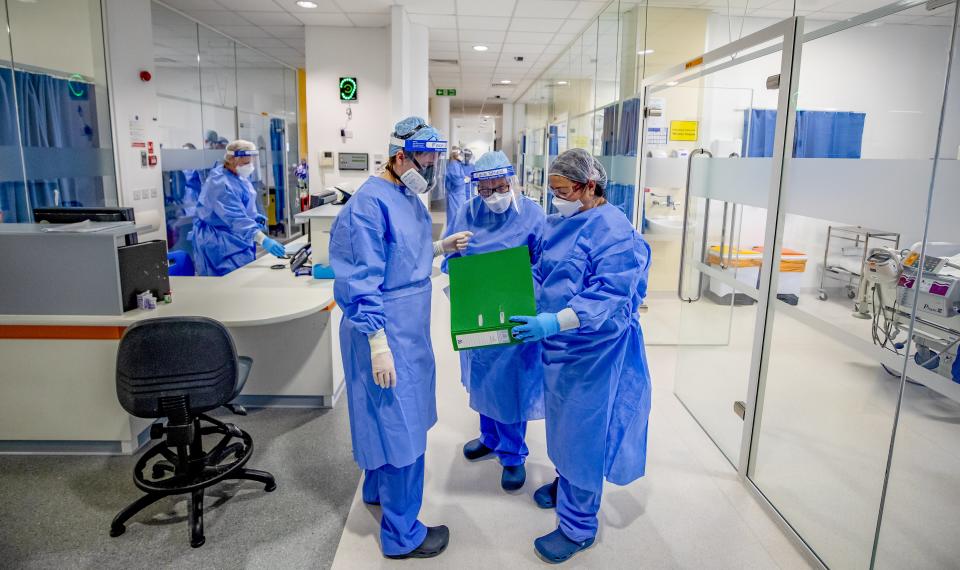FTSE 100 rises as bargain hunters move back in after Tuesday’s bloodbath

Stocks that will benefit most from an end of Covid may be back in fashion
(PA Wire)The FTSE 100 built on yesterday’s modest recovery from Tuesday’s market meltdown with more gains.
Having fallen around 2% on Tuesday and plunging far below the 7000 level it had clawed its way up to recently, the index today gained a further 22 points at 6917.
Last night it closed up around 0.5% and this morning saw more bargain hunters nibbling away at stocks considered to have been oversold in Tuesday’s bloodbath.
That said, the bouncebacks in the previous session did not show much appetite for the biggest fallers from the Covid-induced panic this week. British Airways owner IAG, which was the worst hit, ended flat after an early rally. The bellwether for the international travel industry barely managed a 1% clawback in trading today.
Such “recovery stocks” set to gain from a reopening of economies after Covid rallied well on Wall Street overnight. That followed through into the UK today. Experian, Diageo and Rolls-Royce all joined the leader board with 2-3% gains.
Biggest fallers were BAE, Antofagasta and Rentokil.
The longer term question is: how strong will that recovery prove? While new variants of the virus keep popping up in parts of the world such as India and spreading, guessing when travel restrictions end and tourism begins to climb again is a muddy business.
While deaths and hospitalisations are falling in the UK, last week saw the biggest rate of new cases worldwide on record, with about 5.2 million people around the globe getting infected.
That said, vaccines are clearly working in keeping down the cases in countries with successful jab programmes. The jabs clearly disrupt the virus’s ability to spread, cause widespread illness and kill, as evidenced by the rates seen in vaccinated vs unvaccinated groups.
Speed is clearly of the essence in getting the vaccination programme rolled out across all adult groups if the health, and economic damage is to be limited. Markets will respond accordingly.
A survey out today showed almost 100,000 more businesses were in significant distress in the first three months of the year compared with the previous quarter, and that is before the end of state-funded furlough payments and rates and rent holidays.
Begbies Traynor said the 15% rise was the largest since it began the survey in 2014 and was spread across all 22 sectors it measures.
In Europe, where the slow vaccine rollout has let the pandemic spread and caused new lockdowns, the European Central Bank holds its April meeting on monetary policy. Few fireworks are expected, with investors more focused on Italian prime minister Mario Draghi’s efforts to overhaul his country’s economy.
His plan is contingent on countries pitching in to the long-awaited e750 billion European Recovery Plan which was first agreed nine months ago.
Investors in Spain, Greece and Italy in particular are concerned it could be delayed further, given that they are likely to miss out on another summer tourist season thanks to Covid, CMC Markets pointed out.
With the recovery plan still to happen, the ECB, says CMC, “is the only game in town” for support to struggling nations.
It faces conflicting factors including the fear of rising bond yields and inflation expectations, a strong manufacturing industry bounceback and a weak recovery in the services sector.
Little wonder the ECB’s governing council are beginning to divide over the extent and duration of their e1.85 trillion Pandemic Emergency Asset Purchase programme stimulus.
And no surprise that some investors are beginning to take the view that the global recovery will play far bigger part in Europe’s outlook than the efforts of its central bankers.
Aggreko, the temporary power group which provides generators for events from Glastonbury to the planned Japanese Olympics, may be saved from becoming the latest UK plc to be taken over by private bidders.
The board has recommended a £2.3 billion bid at 880p a share but its biggest shareholder Liontrust Asset Management last night indicated to Sky News that it would be voting against it by today’s deadline. The deal needs the support of 75% of voting shareholders, so all eyes today will be on the second biggest investor, Sprucegrove, for what its intentions are.
Shares fell 25p - or 3% - to 845p, reflecting concerns the deal will not happen.
Read More
FTSE 100 on a knife-edge around 7000 as traders focus on jobless data
Stock markets are telling us we’re saved, but history has a warning
Flutter ‘explores £150 million sale of Oddschecker’
TikTok and the virtual test drive: is this the future of car buying?
